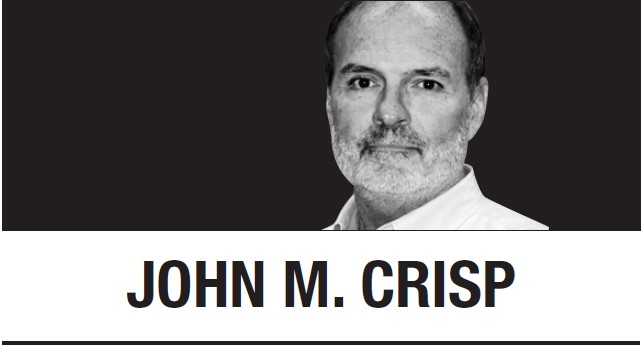[John M. Crisp] Our dangerous failure of imagination
By Korea HeraldPublished : Jan. 24, 2024 - 05:30

Generally, comparisons between Donald Trump and Adolph Hitler aren’t particularly persuasive. They often reflect an over-the-top, sky-is-falling semi-hysteria. Trump and Hitler? Let’s not get carried away.
On the other hand, do we have something to fear from a too-casual complacency engendered by a failure of imagination?
I was thinking about this last week as I read an op-ed entitled “American democratic system will endure,” by Jonathan Turley, a commentator and law professor at George Washington University.
Turley dismisses the notion, suggested by President Joe Biden, that “democracy is on the ballot” in the 2024 election and that “our constitutional system is on the verge of collapse,” as some on the left and the right argue.
He concedes that Trump is responsible for stoking some of this anxiety with his “reckless rhetoric.” Indeed, Trump sometimes sounds Hitlerian. He talks in vague terms about rooting out “vermin,” likely meaning anyone who opposes him. He castigates immigrants for “poisoning the blood of our country.”
And when he jokes about being a dictator for only one day, it’s easy to see how skeptics might imagine that Trump’s supposed humor reflects a deep-seated authoritarian ambition.
Not to worry, says Turley: Even if Trump wants to be a dictator, “it’s not up to him.” Turley reassures us that any anti-constitutional tendency on Trump’s part would be curbed by the legislative and judicial branches. So, relax; nothing to see here.
Turley’s complacency reflects his history as a legal and political analyst, which is reliably Trump friendly. But consider this recent CNBC report on the World Economic Forum entitled “U.S. executives in Davos see a Trump victory in 2024, and no cause for concern.”
According to this report, foreign business leaders are “terrified” at the prospect of a second Trump term, but American business leaders say that foreigners just don’t understand our system of checks and balances. One CEO said that Trump is “all bark and no bite,” and Trump’s rejection of the results of the 2020 election is mere “bloviation.”
OpenAI CEO Sam Altman isn’t worried either: “I believe that America is gonna be fine, no matter what happens in this election.”
But something about this complacency feels ominously naive. Are we failing to imagine what Trump could become and telling ourselves only what we want to hear?
What were people saying about Hitler in the 1930s? No doubt some were issuing the kind of warnings that we sometimes hear about Trump. But a quick web search yields expressions of the same complacency we see in Turley and the CEOs.
For example, consider Henry W. Levy’s “Germany’s Big Question Mark,” printed in The Seattle Times on April 23, 1933. Levy interviews Emil Lengyel, an authority on European affairs and author of “Hitler,” a portrait of the rising leader published in America the previous year. At the time of the interview, Hitler’s appointment as chancellor had been confirmed by a vote of the German people.
As Lengyel puts it, “Hitler is thus Germany’s dictator by the right of the electorate.”
"Should the world be worried? Not really," Lengyel says.
Lengyel “does not believe that Hitler… will initiate as violent a program as some people fear.” In fact, “Hitler and his Nazis must ride the middle course.”
Lengyel relies on the moderating power of Hitler’s “non-Nazi cabinet members.” “The sobering influence of these men,” he says, “will temporize and cause a pause to the more volatile advice of Nazi leaders.”
“Hitler,” Lengyel says, “has no program of his own. … He carries his followers on sentimental appeal. … With penetrating insight into the psychology of his countrymen, he just harped on the humiliations and insults they have had to endure.” His followers, “eager to avenge their country and their own feelings, were swept off their feet by the appeal.”
Hitler may, Lengyel concedes, have “certain hidden powers.” “But I doubt it,” he concludes.
Why does all this feel so ominously familiar?
In any case, our failure to imagine the consequences of electing a man with strong anti-democratic instincts is dangerous.
After all, Hitler became Hitler only in retrospect; what Donald Trump will become still remains to be seen.
John M. Crisp
John M. Crisp, an op-ed columnist for Tribune News Service, lives in Texas and can be reached at jcrispcolumns@gmail.com. -- Ed.
(Tribune Content Agency)
-
Articles by Korea Herald




















